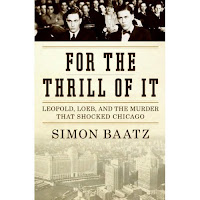Leopold and Loeb
In 1924, 19-year-old Nathan Leopold and his homosexual lover, 18-year-old Richard Loeb, kidnapped and murdered 14-year-old Bobby Franks just for kicks. This weekend I read a fascinating new book by Simon Baatz, For the Thrill of It: Leopold, Loeb, and the Murder That Shocked Chicago.
 Defense attorney Clarence Darrow masterfully saved his clients from the gallows, and Darrow's evolutionary worldview, with its poisonous ideas about individual responsibility, continues to plague our justice system today. But that's beyond the scope of this modest blog post. I just want to point up a few interesting tidbits in the book.
Defense attorney Clarence Darrow masterfully saved his clients from the gallows, and Darrow's evolutionary worldview, with its poisonous ideas about individual responsibility, continues to plague our justice system today. But that's beyond the scope of this modest blog post. I just want to point up a few interesting tidbits in the book.
While meticulously planning the kidnapping and murder for weeks, Nathan Leopold was, umm, a law student fercryinoutloud. Heck, the very day he killed young Bobby he had gone to his commercial law class at 8 in the morning and his agency and torts class at 10. The (stolen) Underwood typewriter that he used to type up his lecture notes he also used to type the ransom note. And a week after he killed Bobby, he took the Harvard law school entrance exams (hoping to transfer from the University of Chicago).
Nathan Leopold was by all accounts a successful law student, yet he fancied himself a Nietzschean "superman" who was above the law. You think ideas have consequences? You think worldviews matter?
Another little tidbit from Baatz's book: Pressuring another inmate for sex proved to be Richard Loeb's demise.
But perhaps the saddest irony is that, only a few days before he was murdered, young Bobby Franks "had won a debate on capital punishment," Baatz writes, "arguing for a link between criminality and mental illness—'most criminals have diseased minds'—and protesting against the right of the state 'to take a man, weak and mentally depraved, and coldly deprive him of his life.'" Clarence Darrow couldn't have said it better himself.
Darrow's arguments may have won the day, but God is not mocked. As Bobby Franks's father himself said: "I understand the two boys boasted they are atheists. I know now they will see there is a God above Who watches all things."
 Defense attorney Clarence Darrow masterfully saved his clients from the gallows, and Darrow's evolutionary worldview, with its poisonous ideas about individual responsibility, continues to plague our justice system today. But that's beyond the scope of this modest blog post. I just want to point up a few interesting tidbits in the book.
Defense attorney Clarence Darrow masterfully saved his clients from the gallows, and Darrow's evolutionary worldview, with its poisonous ideas about individual responsibility, continues to plague our justice system today. But that's beyond the scope of this modest blog post. I just want to point up a few interesting tidbits in the book.While meticulously planning the kidnapping and murder for weeks, Nathan Leopold was, umm, a law student fercryinoutloud. Heck, the very day he killed young Bobby he had gone to his commercial law class at 8 in the morning and his agency and torts class at 10. The (stolen) Underwood typewriter that he used to type up his lecture notes he also used to type the ransom note. And a week after he killed Bobby, he took the Harvard law school entrance exams (hoping to transfer from the University of Chicago).
Nathan Leopold was by all accounts a successful law student, yet he fancied himself a Nietzschean "superman" who was above the law. You think ideas have consequences? You think worldviews matter?
Another little tidbit from Baatz's book: Pressuring another inmate for sex proved to be Richard Loeb's demise.
[James] Day was in an angry, violent mood. Richard had been pestering him for weeks, demanding that they have sex, and threatening to withdraw all his privileges. He entered the shower room and saw Richard, naked, advancing toward him. Day struck at his tormentor with the razor, cutting him on the neck and abdomen, slashing furiously, inflicting fifty-six wounds before turning away and leaving the room, his victim collapsed on the floor in a sea of blood.As one wag put it in the Chicago Daily News: "Richard Loeb, despite his erudition, today ended his sentence with a proposition."
Richard died later that day. ... Nathan rushed from his cell to the prison hospital and watched helplessly as his friend, his companion, his lover, lay dying on the operating table.
But perhaps the saddest irony is that, only a few days before he was murdered, young Bobby Franks "had won a debate on capital punishment," Baatz writes, "arguing for a link between criminality and mental illness—'most criminals have diseased minds'—and protesting against the right of the state 'to take a man, weak and mentally depraved, and coldly deprive him of his life.'" Clarence Darrow couldn't have said it better himself.
Darrow's arguments may have won the day, but God is not mocked. As Bobby Franks's father himself said: "I understand the two boys boasted they are atheists. I know now they will see there is a God above Who watches all things."